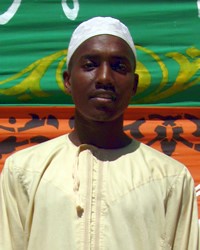The Comorians, formed from a blend of settlers over many centuries, including Austronesians, Iranian traders, mainland Africans, Malagasy, and Arabs, live on a group of islands in the Indian Ocean between Madagascar and Mozambique; there are four main islands plus several smaller ones. The official name of the islands is the Federal and Islamic Republic of the Comoros. Until 1975, all the islands belonged to France. At that time, the three largest islands declared their independence but Mayotte, the fourth island, chose to remain a French possession. Comorian is a Bantu language that looks like, but is not related to, Swahili; each island has its own way of speaking it. The language contains many words of Arabic and French origin. All Comorians receive a Koranic education and learn to write their language in Arabic characters. Formal education is in French. Comorians, whose ancient African origins can be seen in their matrilineal social organization, have been influenced culturally by Arabian Islam and the West. Islam is considered synonymous with civilization, but Comorians also have appropriated many aspects of French culture. The official languages—French, Arabic, and Comorian—reflect that cultural diversity.
Most work as farmers or fishermen, while a few raise cattle, sheep, goats and donkeys. A small number work in industry or in jobs relating to tourism. Children help their parents collect water and wood, farm, fish, and take care of animals; girls often work inside the house, while boys work outside. Men and women share agricultural work; men cut down trees and oversee money-making crops, while women tend to the food-producing fields. Men fish in canoes or in small, imported motorboats, and women sell the fish. Women fish at low tide, using a piece of fabric as a net or a plant that releases a substance that paralyzes small fish.
Rice is the staple of their daily diet, along with manioc and other root vegetables, plantains, fish, coconuts, citrus fruit, pineapples, and milk from grated coconuts. Ceremonial dishes include beef served with white rice and curdled milk as well as enormous cakes. Another traditional dish is gruel or porridge made with the dried fruit of sago palms. French cuisine and imported beverages are becoming prevalent for those who can afford it. Vanilla, cloves, copra, and ylang ylang, which gave the Comoros the name "Perfume Islands," account for most exports to France, Germany, and the United States. Comorians import construction materials, food, and petroleum. France provides the largest amount of aid, followed by the European Union and the World Bank. Large financial transfers come from Comorians from Ngazidja who live in France.
Polygamy is an acceptable practice among the Comorian people. Being matrilineal, it is customary for new families to locating in physical proximity to the family of the wife. Male social organization rests on age group and status. There are musical associations and sports clubs in every village. Female social organization, which is less formal, occurs through help groups and customary associations for development. Most women's organizations are devoted to community development and the training of women and youths.
The fundamental social unit for Ngazidja Comorians is the village or city neighborhood. On Ngazidja, the classification of the male population into age and traditional groups gives each person a role in the village hierarchy. Customary oral law includes sanctions against disrespect toward elders, disobedience, theft, and adultery. Until he pays a fine in money or cattle, a convicted person is banished, and he and his family are cut off from the village's social life. If a crime has been committed, the criminal's village may be banished by the regional leaders. Customary law and Muslim law are carried out by Islamic judges in matters of personal rights and inheritance. Modern courts try penal cases.
The Ngazidja Comorians are Sunni Muslims from the Shafiite school, one of the most conservative branches of Islamic interpretation and legal practice, yet mosque attendance is very low. Mixed with their Islamic practices is a strong involvement in occultism and spirit possession. Traditionally, the Ngazidja Comorians have been very resistant to any kind of religious change; however, they are gradually becoming more receptive to other ideas. There are few Christian believers due to anti-conversion laws.
However, the number of believers in Christ is growing slowly thanks primarily to the witness of the first Comorian believer. The JESUS Film, gospel recordings for oral learners, and the New Testament are also available. In recent years additional Bible translation work has begun, and a translation team has learned enough of the language to compose worship songs. Being very fond of music, the singing of these hymns has created curiosity among the Ngazidje Comorians.
The physical needs of the Ngazidja Comorians are numerous. There is a shortage of hospitals and doctors, and many people suffer from illnesses and chronic malnutrition. Because of a poor water supply, they lack good hygiene. Such problems contribute to a high death rate, especially among young children.
The spiritual needs of the Ngazidja Comorians are even greater than their physical needs. Evangelism is not well received. Their commitment to Islam, coupled with involvement in occult practices, has made these people difficult to reach.
Ask the Lord to call people who are willing to go to the Ngazidja Comorians and share the gospel until there is a movement to Christ.
Ask the Lord to send Christian teachers and medical teams to work among the Ngazidja Comorians.
Ask the Lord to grant wisdom and favor to mission agencies focusing on the Comorians.
Pray that God will give the small number of Comorian believers boldness to share Christ with their own people.
Ask God to raise an army of regular intercessors for the Comorians.
Scripture Prayers for the Comorian, Ngazidja in Reunion.
| Profile Source: Joshua Project |











